Comprehensive Report: Business Law in the United Kingdom
VerifiedAdded on 2022/12/17
|10
|2020
|2
Report
AI Summary
This report provides a detailed overview of business law in the United Kingdom. It begins with an introduction to business law, defining its role in regulating economic activities and resolving disputes. The report then delves into the UK's legal system, including its constitutional monarchy and the incorporation of European legislation. It classifies laws into civil and criminal categories, providing examples of each and explaining the roles of the High Court and Supreme Court. The report further explores case law as a source of law and the process of making legislation, including the stages of first reading, committee stage, and royal assent. It also defines and provides examples of delegated legislation. Finally, the report examines employment law, outlining statutory duties of employers and the concepts of wrongful and unfair dismissal. The report concludes by summarizing the key aspects of business law discussed.
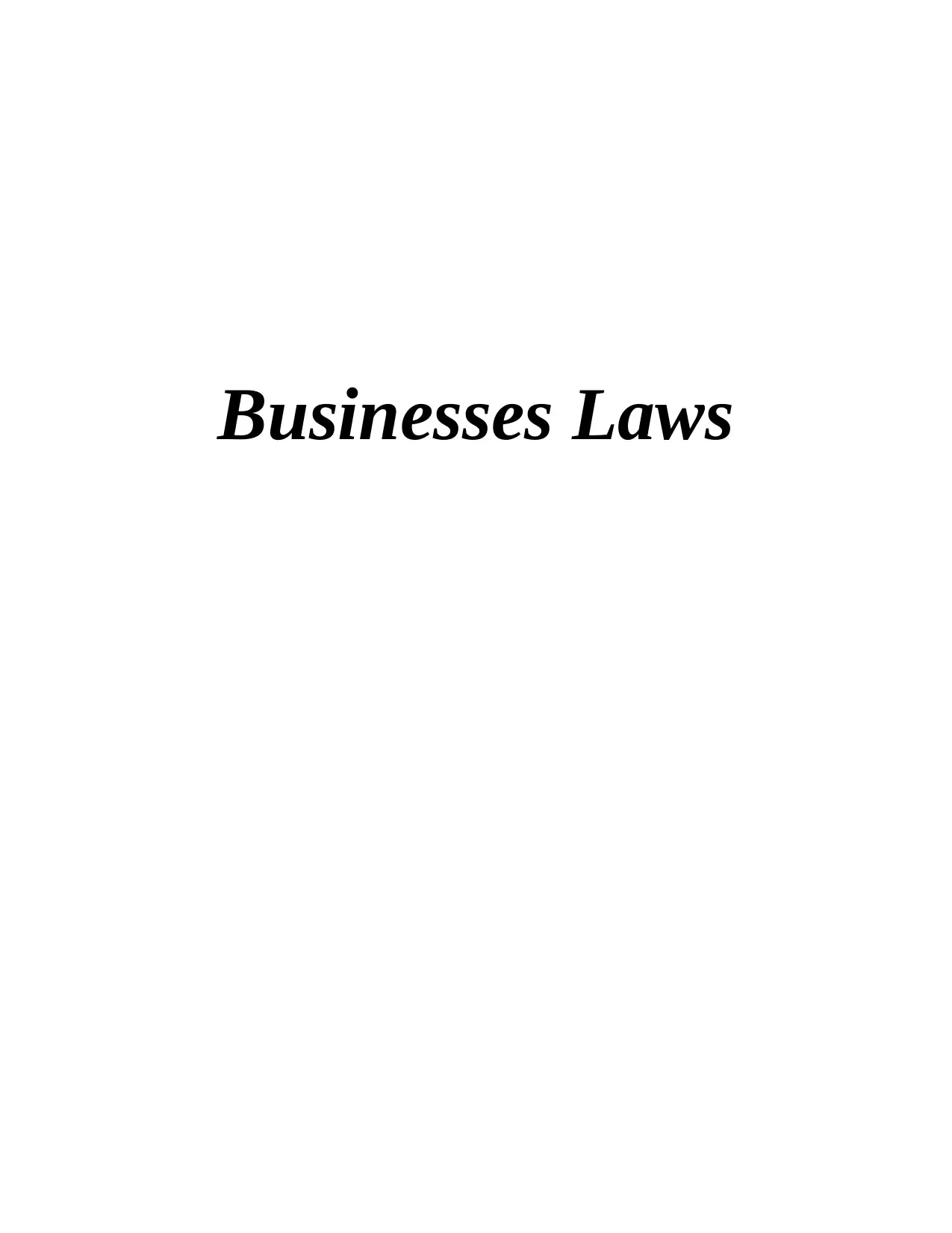
Businesses Laws
Paraphrase This Document
Need a fresh take? Get an instant paraphrase of this document with our AI Paraphraser
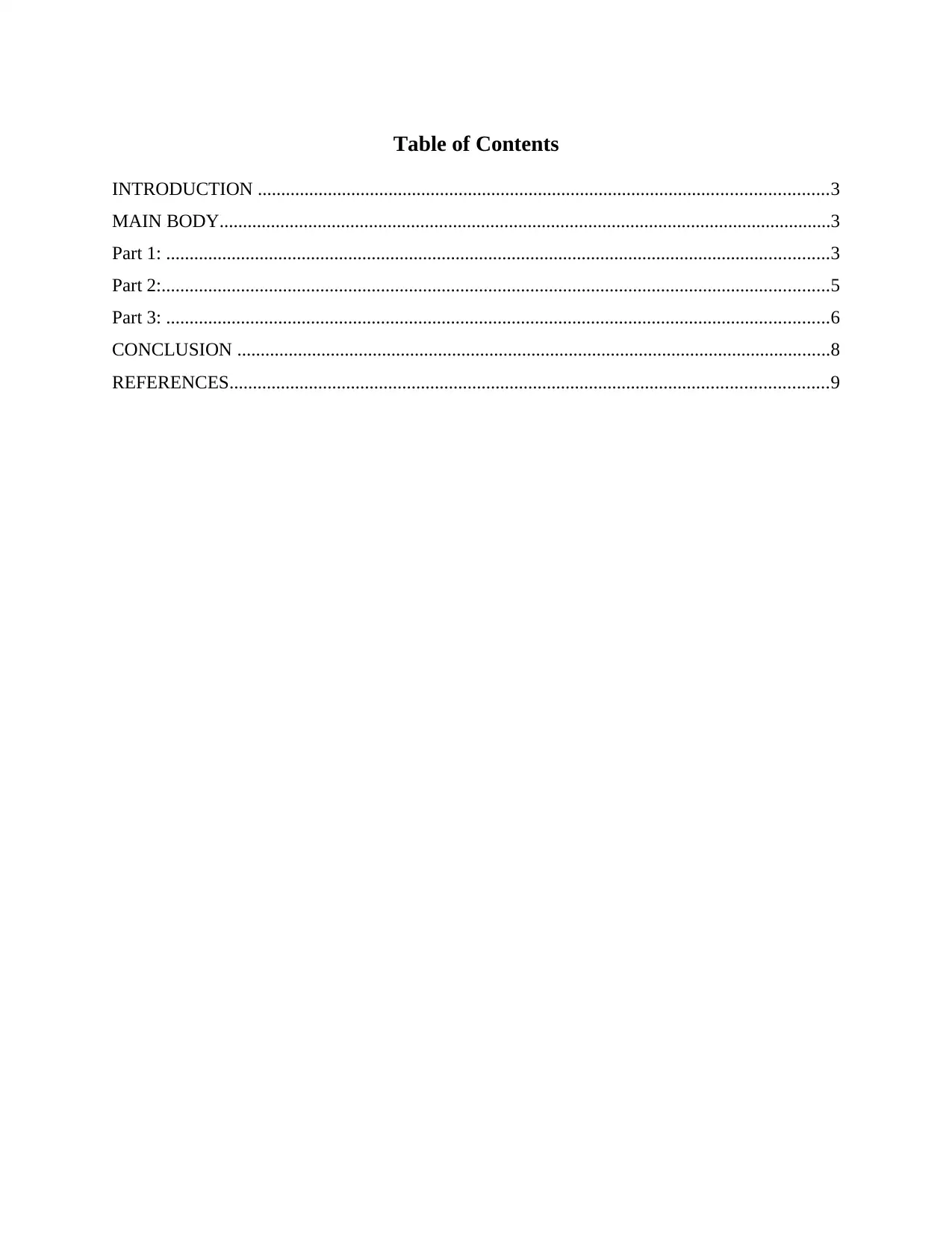
Table of Contents
INTRODUCTION ..........................................................................................................................3
MAIN BODY...................................................................................................................................3
Part 1: ..............................................................................................................................................3
Part 2:...............................................................................................................................................5
Part 3: ..............................................................................................................................................6
CONCLUSION ...............................................................................................................................8
REFERENCES................................................................................................................................9
INTRODUCTION ..........................................................................................................................3
MAIN BODY...................................................................................................................................3
Part 1: ..............................................................................................................................................3
Part 2:...............................................................................................................................................5
Part 3: ..............................................................................................................................................6
CONCLUSION ...............................................................................................................................8
REFERENCES................................................................................................................................9
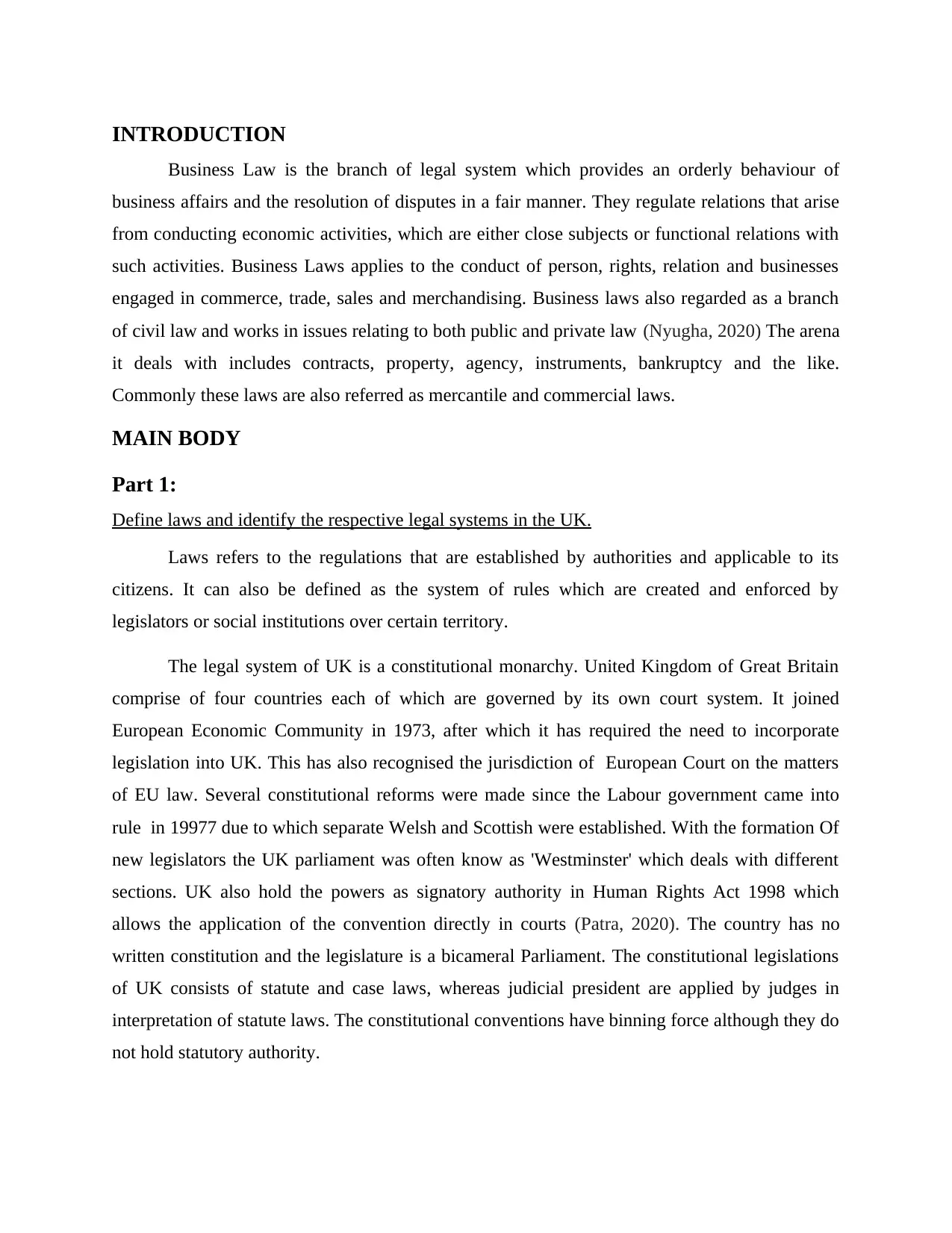
INTRODUCTION
Business Law is the branch of legal system which provides an orderly behaviour of
business affairs and the resolution of disputes in a fair manner. They regulate relations that arise
from conducting economic activities, which are either close subjects or functional relations with
such activities. Business Laws applies to the conduct of person, rights, relation and businesses
engaged in commerce, trade, sales and merchandising. Business laws also regarded as a branch
of civil law and works in issues relating to both public and private law (Nyugha, 2020) The arena
it deals with includes contracts, property, agency, instruments, bankruptcy and the like.
Commonly these laws are also referred as mercantile and commercial laws.
MAIN BODY
Part 1:
Define laws and identify the respective legal systems in the UK.
Laws refers to the regulations that are established by authorities and applicable to its
citizens. It can also be defined as the system of rules which are created and enforced by
legislators or social institutions over certain territory.
The legal system of UK is a constitutional monarchy. United Kingdom of Great Britain
comprise of four countries each of which are governed by its own court system. It joined
European Economic Community in 1973, after which it has required the need to incorporate
legislation into UK. This has also recognised the jurisdiction of European Court on the matters
of EU law. Several constitutional reforms were made since the Labour government came into
rule in 19977 due to which separate Welsh and Scottish were established. With the formation Of
new legislators the UK parliament was often know as 'Westminster' which deals with different
sections. UK also hold the powers as signatory authority in Human Rights Act 1998 which
allows the application of the convention directly in courts (Patra, 2020). The country has no
written constitution and the legislature is a bicameral Parliament. The constitutional legislations
of UK consists of statute and case laws, whereas judicial president are applied by judges in
interpretation of statute laws. The constitutional conventions have binning force although they do
not hold statutory authority.
Business Law is the branch of legal system which provides an orderly behaviour of
business affairs and the resolution of disputes in a fair manner. They regulate relations that arise
from conducting economic activities, which are either close subjects or functional relations with
such activities. Business Laws applies to the conduct of person, rights, relation and businesses
engaged in commerce, trade, sales and merchandising. Business laws also regarded as a branch
of civil law and works in issues relating to both public and private law (Nyugha, 2020) The arena
it deals with includes contracts, property, agency, instruments, bankruptcy and the like.
Commonly these laws are also referred as mercantile and commercial laws.
MAIN BODY
Part 1:
Define laws and identify the respective legal systems in the UK.
Laws refers to the regulations that are established by authorities and applicable to its
citizens. It can also be defined as the system of rules which are created and enforced by
legislators or social institutions over certain territory.
The legal system of UK is a constitutional monarchy. United Kingdom of Great Britain
comprise of four countries each of which are governed by its own court system. It joined
European Economic Community in 1973, after which it has required the need to incorporate
legislation into UK. This has also recognised the jurisdiction of European Court on the matters
of EU law. Several constitutional reforms were made since the Labour government came into
rule in 19977 due to which separate Welsh and Scottish were established. With the formation Of
new legislators the UK parliament was often know as 'Westminster' which deals with different
sections. UK also hold the powers as signatory authority in Human Rights Act 1998 which
allows the application of the convention directly in courts (Patra, 2020). The country has no
written constitution and the legislature is a bicameral Parliament. The constitutional legislations
of UK consists of statute and case laws, whereas judicial president are applied by judges in
interpretation of statute laws. The constitutional conventions have binning force although they do
not hold statutory authority.
⊘ This is a preview!⊘
Do you want full access?
Subscribe today to unlock all pages.

Trusted by 1+ million students worldwide
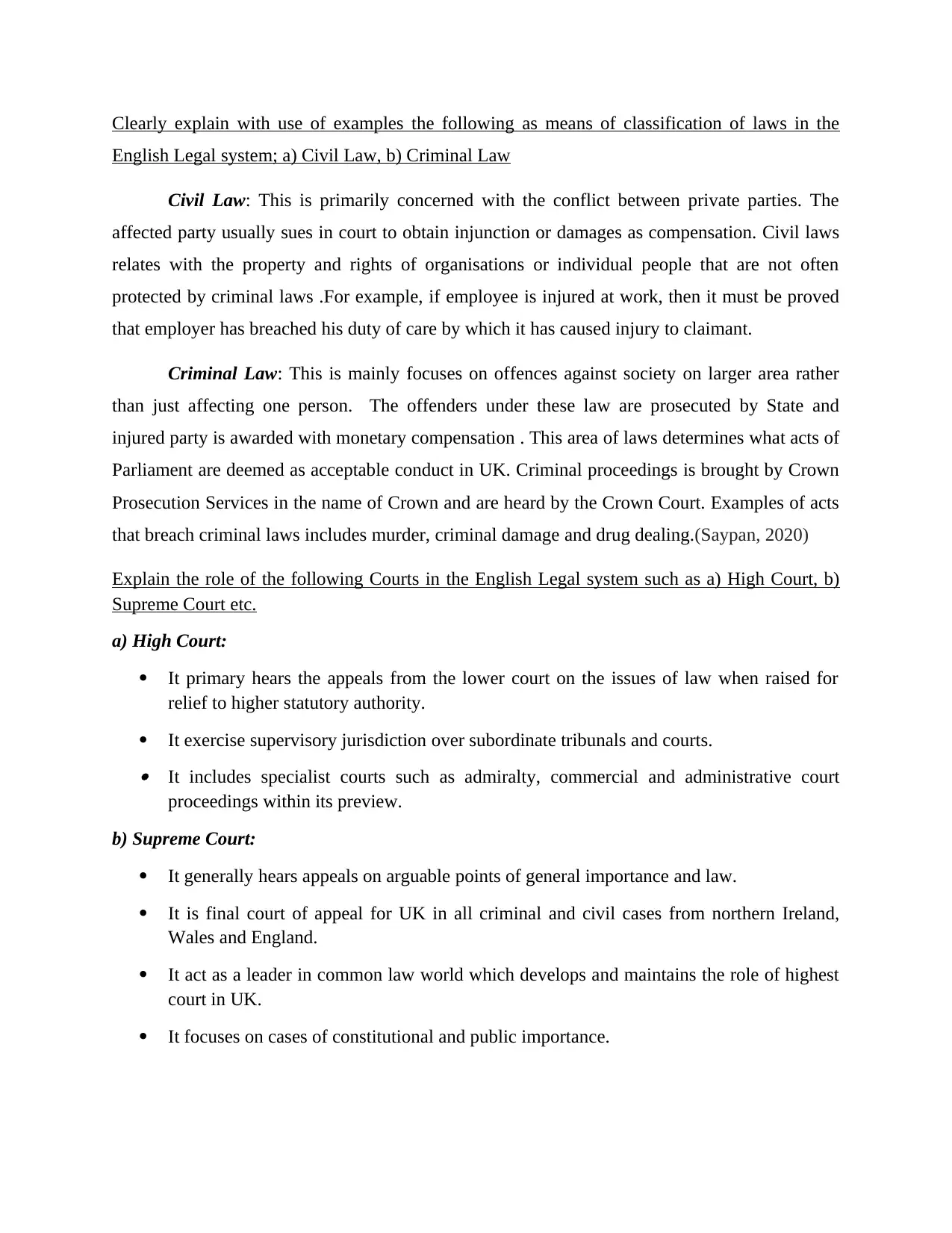
Clearly explain with use of examples the following as means of classification of laws in the
English Legal system; a) Civil Law, b) Criminal Law
Civil Law: This is primarily concerned with the conflict between private parties. The
affected party usually sues in court to obtain injunction or damages as compensation. Civil laws
relates with the property and rights of organisations or individual people that are not often
protected by criminal laws .For example, if employee is injured at work, then it must be proved
that employer has breached his duty of care by which it has caused injury to claimant.
Criminal Law: This is mainly focuses on offences against society on larger area rather
than just affecting one person. The offenders under these law are prosecuted by State and
injured party is awarded with monetary compensation . This area of laws determines what acts of
Parliament are deemed as acceptable conduct in UK. Criminal proceedings is brought by Crown
Prosecution Services in the name of Crown and are heard by the Crown Court. Examples of acts
that breach criminal laws includes murder, criminal damage and drug dealing.(Saypan, 2020)
Explain the role of the following Courts in the English Legal system such as a) High Court, b)
Supreme Court etc.
a) High Court:
It primary hears the appeals from the lower court on the issues of law when raised for
relief to higher statutory authority.
It exercise supervisory jurisdiction over subordinate tribunals and courts. It includes specialist courts such as admiralty, commercial and administrative court
proceedings within its preview.
b) Supreme Court:
It generally hears appeals on arguable points of general importance and law.
It is final court of appeal for UK in all criminal and civil cases from northern Ireland,
Wales and England.
It act as a leader in common law world which develops and maintains the role of highest
court in UK.
It focuses on cases of constitutional and public importance.
English Legal system; a) Civil Law, b) Criminal Law
Civil Law: This is primarily concerned with the conflict between private parties. The
affected party usually sues in court to obtain injunction or damages as compensation. Civil laws
relates with the property and rights of organisations or individual people that are not often
protected by criminal laws .For example, if employee is injured at work, then it must be proved
that employer has breached his duty of care by which it has caused injury to claimant.
Criminal Law: This is mainly focuses on offences against society on larger area rather
than just affecting one person. The offenders under these law are prosecuted by State and
injured party is awarded with monetary compensation . This area of laws determines what acts of
Parliament are deemed as acceptable conduct in UK. Criminal proceedings is brought by Crown
Prosecution Services in the name of Crown and are heard by the Crown Court. Examples of acts
that breach criminal laws includes murder, criminal damage and drug dealing.(Saypan, 2020)
Explain the role of the following Courts in the English Legal system such as a) High Court, b)
Supreme Court etc.
a) High Court:
It primary hears the appeals from the lower court on the issues of law when raised for
relief to higher statutory authority.
It exercise supervisory jurisdiction over subordinate tribunals and courts. It includes specialist courts such as admiralty, commercial and administrative court
proceedings within its preview.
b) Supreme Court:
It generally hears appeals on arguable points of general importance and law.
It is final court of appeal for UK in all criminal and civil cases from northern Ireland,
Wales and England.
It act as a leader in common law world which develops and maintains the role of highest
court in UK.
It focuses on cases of constitutional and public importance.
Paraphrase This Document
Need a fresh take? Get an instant paraphrase of this document with our AI Paraphraser
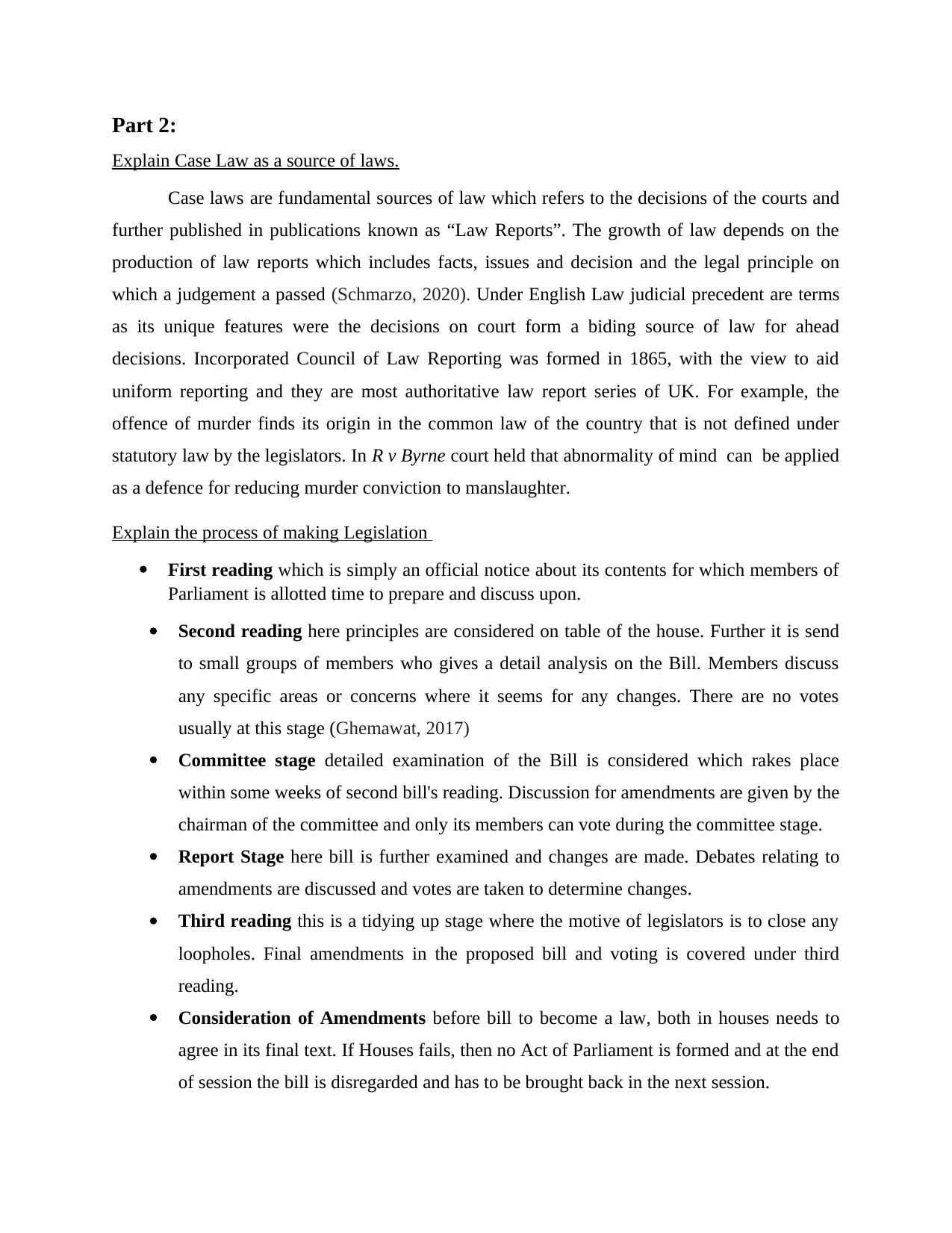
Part 2:
Explain Case Law as a source of laws.
Case laws are fundamental sources of law which refers to the decisions of the courts and
further published in publications known as “Law Reports”. The growth of law depends on the
production of law reports which includes facts, issues and decision and the legal principle on
which a judgement a passed (Schmarzo, 2020). Under English Law judicial precedent are terms
as its unique features were the decisions on court form a biding source of law for ahead
decisions. Incorporated Council of Law Reporting was formed in 1865, with the view to aid
uniform reporting and they are most authoritative law report series of UK. For example, the
offence of murder finds its origin in the common law of the country that is not defined under
statutory law by the legislators. In R v Byrne court held that abnormality of mind can be applied
as a defence for reducing murder conviction to manslaughter.
Explain the process of making Legislation
First reading which is simply an official notice about its contents for which members of
Parliament is allotted time to prepare and discuss upon.
Second reading here principles are considered on table of the house. Further it is send
to small groups of members who gives a detail analysis on the Bill. Members discuss
any specific areas or concerns where it seems for any changes. There are no votes
usually at this stage (Ghemawat, 2017)
Committee stage detailed examination of the Bill is considered which rakes place
within some weeks of second bill's reading. Discussion for amendments are given by the
chairman of the committee and only its members can vote during the committee stage.
Report Stage here bill is further examined and changes are made. Debates relating to
amendments are discussed and votes are taken to determine changes.
Third reading this is a tidying up stage where the motive of legislators is to close any
loopholes. Final amendments in the proposed bill and voting is covered under third
reading.
Consideration of Amendments before bill to become a law, both in houses needs to
agree in its final text. If Houses fails, then no Act of Parliament is formed and at the end
of session the bill is disregarded and has to be brought back in the next session.
Explain Case Law as a source of laws.
Case laws are fundamental sources of law which refers to the decisions of the courts and
further published in publications known as “Law Reports”. The growth of law depends on the
production of law reports which includes facts, issues and decision and the legal principle on
which a judgement a passed (Schmarzo, 2020). Under English Law judicial precedent are terms
as its unique features were the decisions on court form a biding source of law for ahead
decisions. Incorporated Council of Law Reporting was formed in 1865, with the view to aid
uniform reporting and they are most authoritative law report series of UK. For example, the
offence of murder finds its origin in the common law of the country that is not defined under
statutory law by the legislators. In R v Byrne court held that abnormality of mind can be applied
as a defence for reducing murder conviction to manslaughter.
Explain the process of making Legislation
First reading which is simply an official notice about its contents for which members of
Parliament is allotted time to prepare and discuss upon.
Second reading here principles are considered on table of the house. Further it is send
to small groups of members who gives a detail analysis on the Bill. Members discuss
any specific areas or concerns where it seems for any changes. There are no votes
usually at this stage (Ghemawat, 2017)
Committee stage detailed examination of the Bill is considered which rakes place
within some weeks of second bill's reading. Discussion for amendments are given by the
chairman of the committee and only its members can vote during the committee stage.
Report Stage here bill is further examined and changes are made. Debates relating to
amendments are discussed and votes are taken to determine changes.
Third reading this is a tidying up stage where the motive of legislators is to close any
loopholes. Final amendments in the proposed bill and voting is covered under third
reading.
Consideration of Amendments before bill to become a law, both in houses needs to
agree in its final text. If Houses fails, then no Act of Parliament is formed and at the end
of session the bill is disregarded and has to be brought back in the next session.
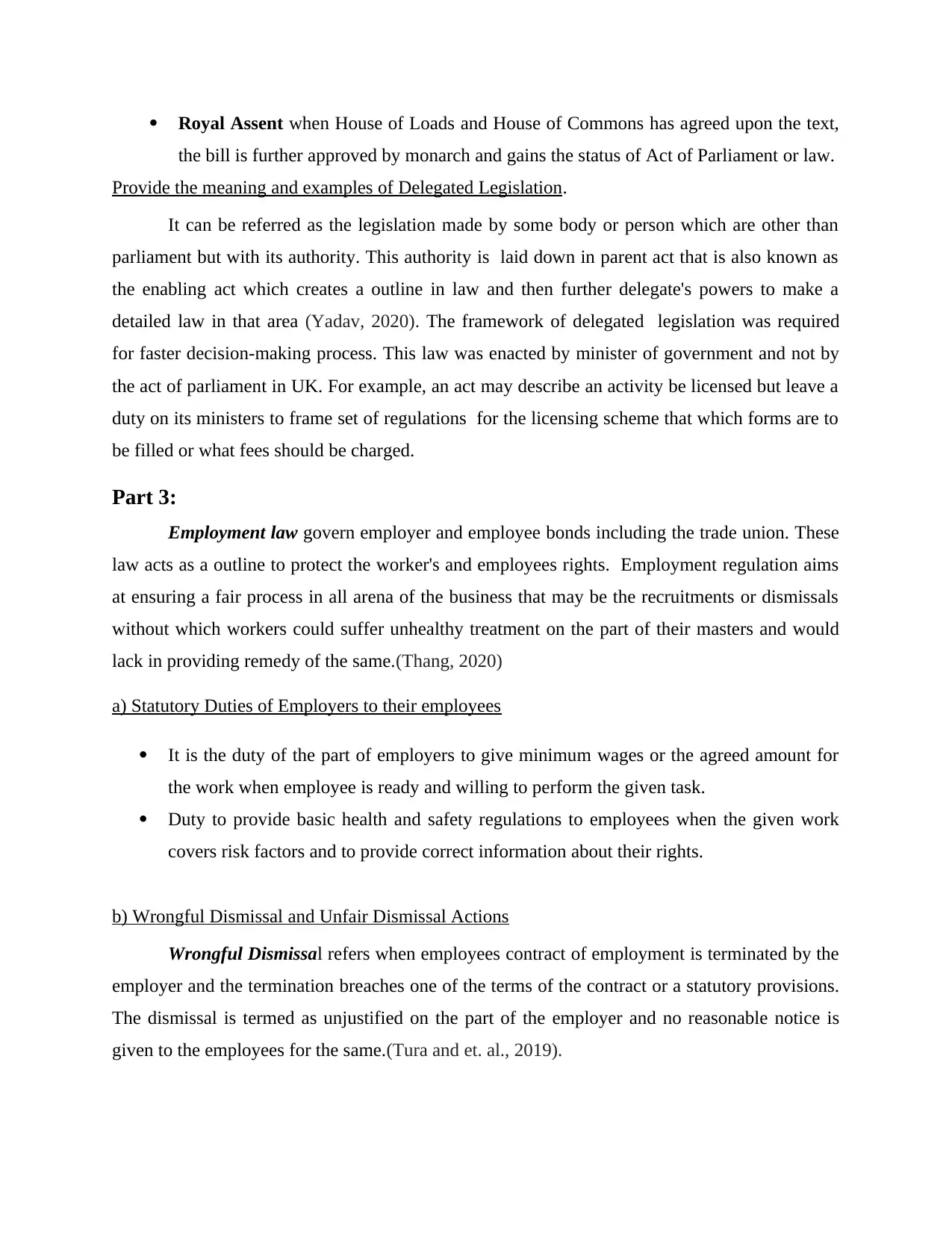
Royal Assent when House of Loads and House of Commons has agreed upon the text,
the bill is further approved by monarch and gains the status of Act of Parliament or law.
Provide the meaning and examples of Delegated Legislation.
It can be referred as the legislation made by some body or person which are other than
parliament but with its authority. This authority is laid down in parent act that is also known as
the enabling act which creates a outline in law and then further delegate's powers to make a
detailed law in that area (Yadav, 2020). The framework of delegated legislation was required
for faster decision-making process. This law was enacted by minister of government and not by
the act of parliament in UK. For example, an act may describe an activity be licensed but leave a
duty on its ministers to frame set of regulations for the licensing scheme that which forms are to
be filled or what fees should be charged.
Part 3:
Employment law govern employer and employee bonds including the trade union. These
law acts as a outline to protect the worker's and employees rights. Employment regulation aims
at ensuring a fair process in all arena of the business that may be the recruitments or dismissals
without which workers could suffer unhealthy treatment on the part of their masters and would
lack in providing remedy of the same.(Thang, 2020)
a) Statutory Duties of Employers to their employees
It is the duty of the part of employers to give minimum wages or the agreed amount for
the work when employee is ready and willing to perform the given task.
Duty to provide basic health and safety regulations to employees when the given work
covers risk factors and to provide correct information about their rights.
b) Wrongful Dismissal and Unfair Dismissal Actions
Wrongful Dismissal refers when employees contract of employment is terminated by the
employer and the termination breaches one of the terms of the contract or a statutory provisions.
The dismissal is termed as unjustified on the part of the employer and no reasonable notice is
given to the employees for the same.(Tura and et. al., 2019).
the bill is further approved by monarch and gains the status of Act of Parliament or law.
Provide the meaning and examples of Delegated Legislation.
It can be referred as the legislation made by some body or person which are other than
parliament but with its authority. This authority is laid down in parent act that is also known as
the enabling act which creates a outline in law and then further delegate's powers to make a
detailed law in that area (Yadav, 2020). The framework of delegated legislation was required
for faster decision-making process. This law was enacted by minister of government and not by
the act of parliament in UK. For example, an act may describe an activity be licensed but leave a
duty on its ministers to frame set of regulations for the licensing scheme that which forms are to
be filled or what fees should be charged.
Part 3:
Employment law govern employer and employee bonds including the trade union. These
law acts as a outline to protect the worker's and employees rights. Employment regulation aims
at ensuring a fair process in all arena of the business that may be the recruitments or dismissals
without which workers could suffer unhealthy treatment on the part of their masters and would
lack in providing remedy of the same.(Thang, 2020)
a) Statutory Duties of Employers to their employees
It is the duty of the part of employers to give minimum wages or the agreed amount for
the work when employee is ready and willing to perform the given task.
Duty to provide basic health and safety regulations to employees when the given work
covers risk factors and to provide correct information about their rights.
b) Wrongful Dismissal and Unfair Dismissal Actions
Wrongful Dismissal refers when employees contract of employment is terminated by the
employer and the termination breaches one of the terms of the contract or a statutory provisions.
The dismissal is termed as unjustified on the part of the employer and no reasonable notice is
given to the employees for the same.(Tura and et. al., 2019).
⊘ This is a preview!⊘
Do you want full access?
Subscribe today to unlock all pages.

Trusted by 1+ million students worldwide
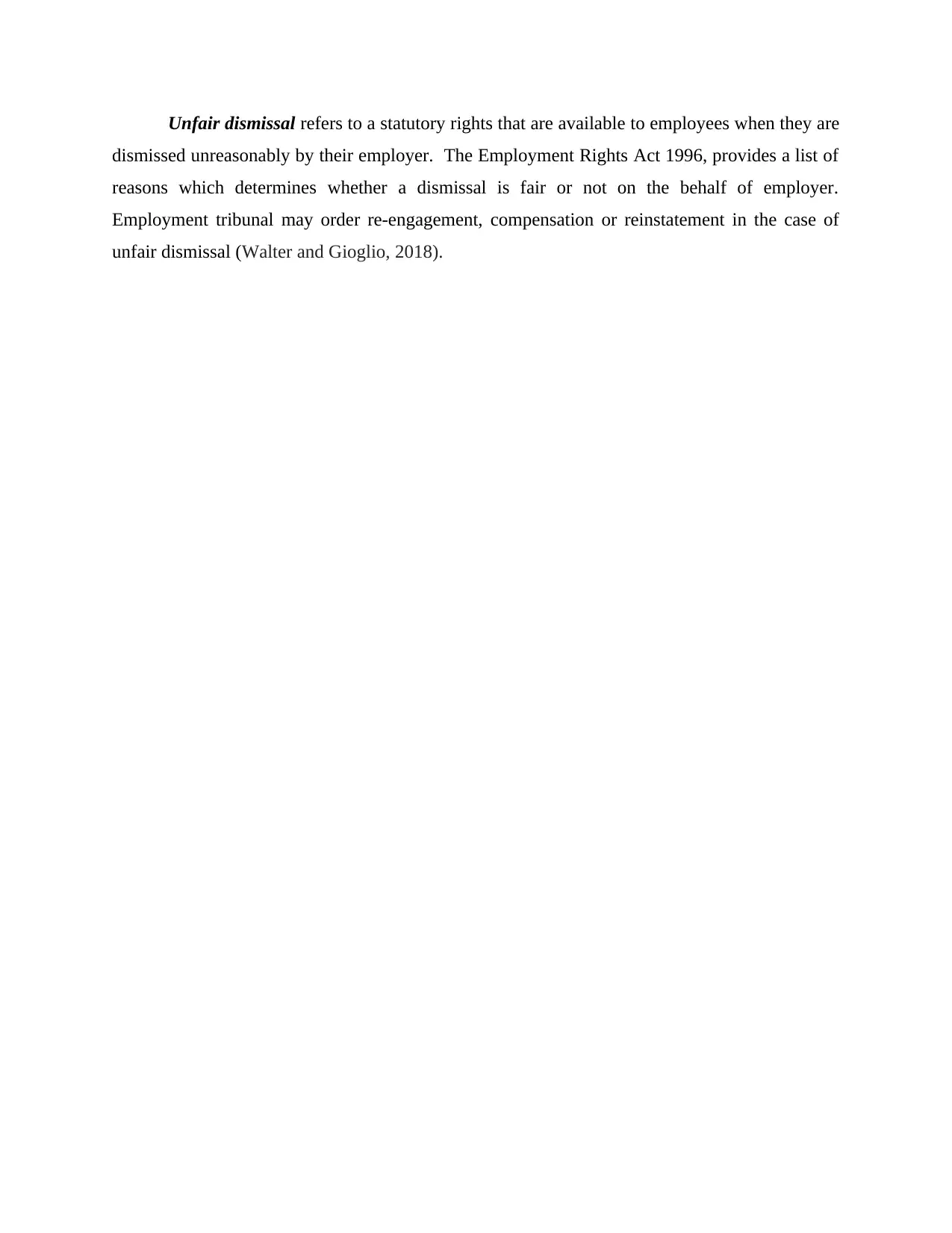
Unfair dismissal refers to a statutory rights that are available to employees when they are
dismissed unreasonably by their employer. The Employment Rights Act 1996, provides a list of
reasons which determines whether a dismissal is fair or not on the behalf of employer.
Employment tribunal may order re-engagement, compensation or reinstatement in the case of
unfair dismissal (Walter and Gioglio, 2018).
dismissed unreasonably by their employer. The Employment Rights Act 1996, provides a list of
reasons which determines whether a dismissal is fair or not on the behalf of employer.
Employment tribunal may order re-engagement, compensation or reinstatement in the case of
unfair dismissal (Walter and Gioglio, 2018).
Paraphrase This Document
Need a fresh take? Get an instant paraphrase of this document with our AI Paraphraser
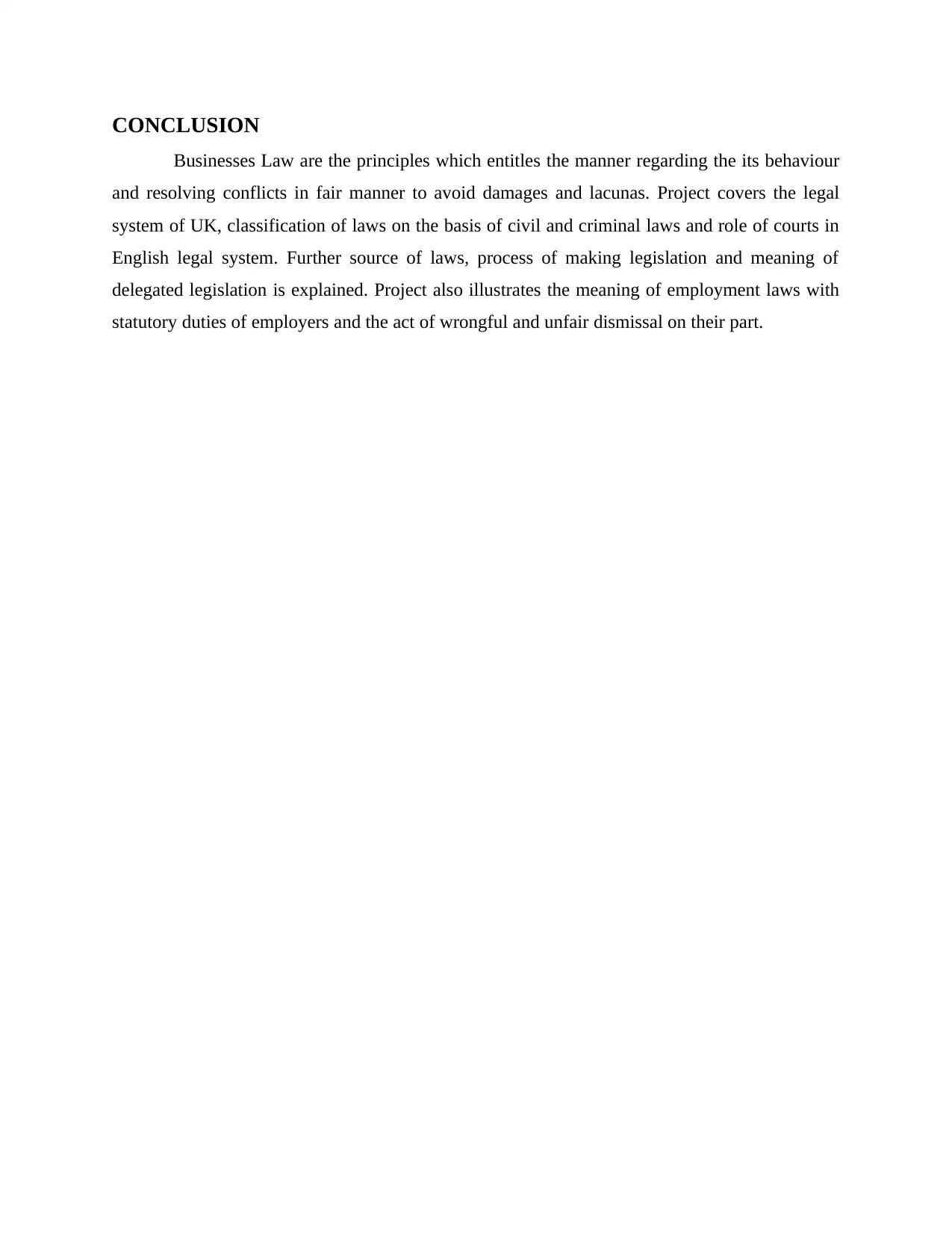
CONCLUSION
Businesses Law are the principles which entitles the manner regarding the its behaviour
and resolving conflicts in fair manner to avoid damages and lacunas. Project covers the legal
system of UK, classification of laws on the basis of civil and criminal laws and role of courts in
English legal system. Further source of laws, process of making legislation and meaning of
delegated legislation is explained. Project also illustrates the meaning of employment laws with
statutory duties of employers and the act of wrongful and unfair dismissal on their part.
Businesses Law are the principles which entitles the manner regarding the its behaviour
and resolving conflicts in fair manner to avoid damages and lacunas. Project covers the legal
system of UK, classification of laws on the basis of civil and criminal laws and role of courts in
English legal system. Further source of laws, process of making legislation and meaning of
delegated legislation is explained. Project also illustrates the meaning of employment laws with
statutory duties of employers and the act of wrongful and unfair dismissal on their part.
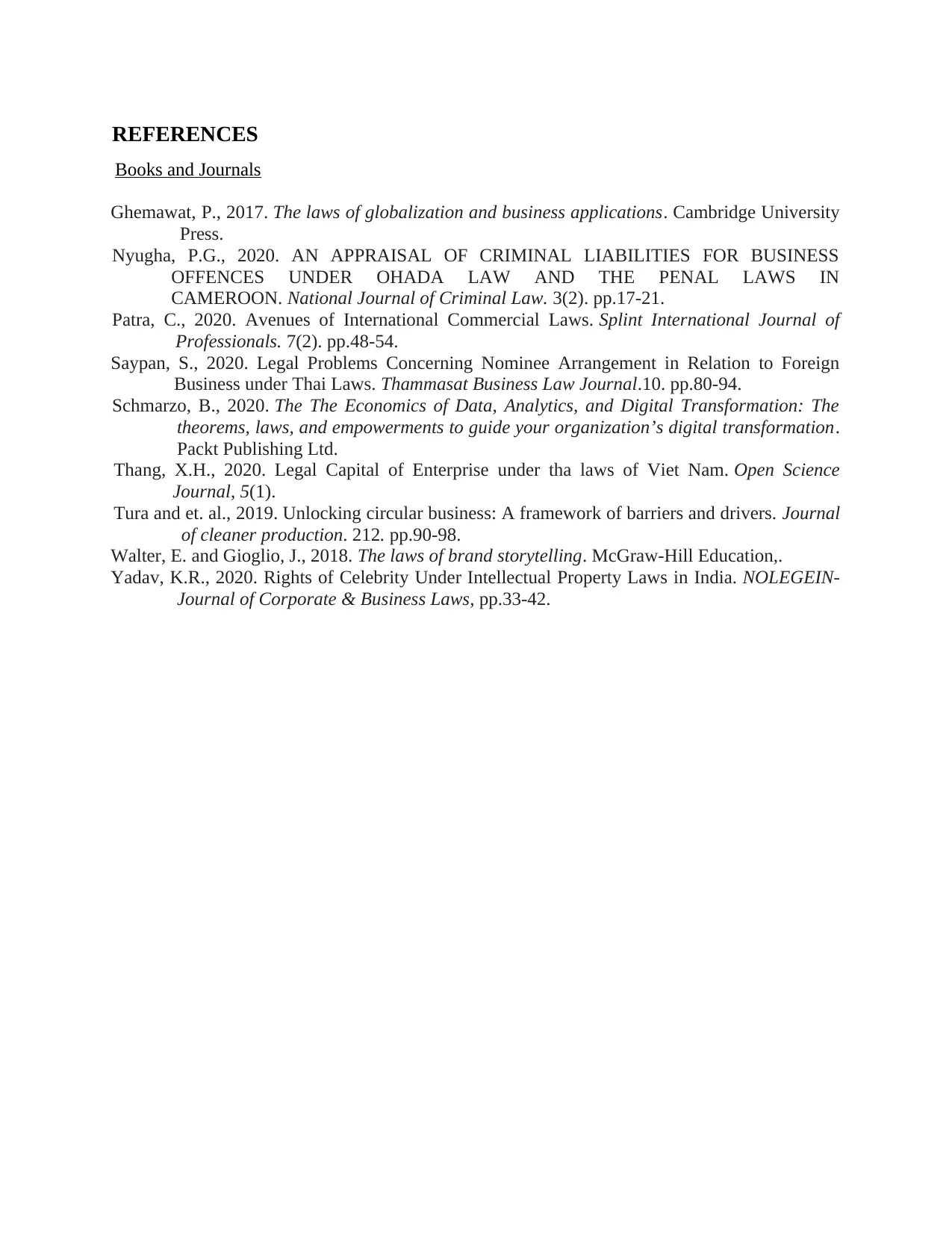
REFERENCES
Books and Journals
Ghemawat, P., 2017. The laws of globalization and business applications. Cambridge University
Press.
Nyugha, P.G., 2020. AN APPRAISAL OF CRIMINAL LIABILITIES FOR BUSINESS
OFFENCES UNDER OHADA LAW AND THE PENAL LAWS IN
CAMEROON. National Journal of Criminal Law. 3(2). pp.17-21.
Patra, C., 2020. Avenues of International Commercial Laws. Splint International Journal of
Professionals. 7(2). pp.48-54.
Saypan, S., 2020. Legal Problems Concerning Nominee Arrangement in Relation to Foreign
Business under Thai Laws. Thammasat Business Law Journal.10. pp.80-94.
Schmarzo, B., 2020. The The Economics of Data, Analytics, and Digital Transformation: The
theorems, laws, and empowerments to guide your organization’s digital transformation.
Packt Publishing Ltd.
Thang, X.H., 2020. Legal Capital of Enterprise under tha laws of Viet Nam. Open Science
Journal, 5(1).
Tura and et. al., 2019. Unlocking circular business: A framework of barriers and drivers. Journal
of cleaner production. 212. pp.90-98.
Walter, E. and Gioglio, J., 2018. The laws of brand storytelling. McGraw-Hill Education,.
Yadav, K.R., 2020. Rights of Celebrity Under Intellectual Property Laws in India. NOLEGEIN-
Journal of Corporate & Business Laws, pp.33-42.
Books and Journals
Ghemawat, P., 2017. The laws of globalization and business applications. Cambridge University
Press.
Nyugha, P.G., 2020. AN APPRAISAL OF CRIMINAL LIABILITIES FOR BUSINESS
OFFENCES UNDER OHADA LAW AND THE PENAL LAWS IN
CAMEROON. National Journal of Criminal Law. 3(2). pp.17-21.
Patra, C., 2020. Avenues of International Commercial Laws. Splint International Journal of
Professionals. 7(2). pp.48-54.
Saypan, S., 2020. Legal Problems Concerning Nominee Arrangement in Relation to Foreign
Business under Thai Laws. Thammasat Business Law Journal.10. pp.80-94.
Schmarzo, B., 2020. The The Economics of Data, Analytics, and Digital Transformation: The
theorems, laws, and empowerments to guide your organization’s digital transformation.
Packt Publishing Ltd.
Thang, X.H., 2020. Legal Capital of Enterprise under tha laws of Viet Nam. Open Science
Journal, 5(1).
Tura and et. al., 2019. Unlocking circular business: A framework of barriers and drivers. Journal
of cleaner production. 212. pp.90-98.
Walter, E. and Gioglio, J., 2018. The laws of brand storytelling. McGraw-Hill Education,.
Yadav, K.R., 2020. Rights of Celebrity Under Intellectual Property Laws in India. NOLEGEIN-
Journal of Corporate & Business Laws, pp.33-42.
⊘ This is a preview!⊘
Do you want full access?
Subscribe today to unlock all pages.

Trusted by 1+ million students worldwide

1 out of 10
Related Documents
Your All-in-One AI-Powered Toolkit for Academic Success.
+13062052269
info@desklib.com
Available 24*7 on WhatsApp / Email
![[object Object]](/_next/static/media/star-bottom.7253800d.svg)
Unlock your academic potential
Copyright © 2020–2026 A2Z Services. All Rights Reserved. Developed and managed by ZUCOL.





